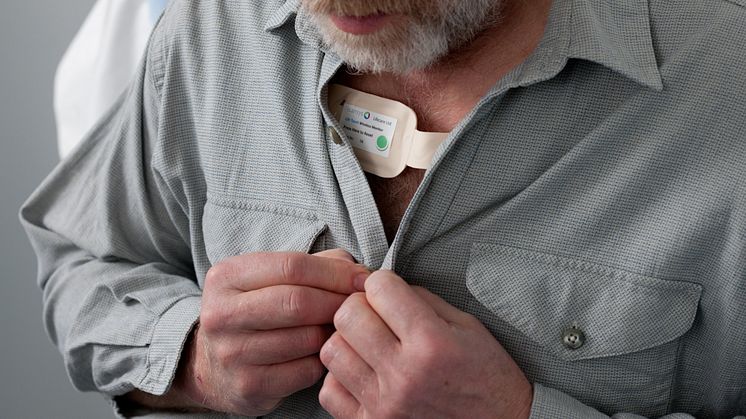
News -
Isansys wins two SBRI Healthcare development contracts to improve patient safety and reduce risks for cancer patients
Isansys Lifecare Limited, the provider of complete real-time physiological patient status services and systems, today announces that it has won two SBRI (Small Business Research Initiative) Healthcare contracts. Granted as part of NHS England’s initiative to enhance the adoption of innovative devices and new technologies, the contracts have been signed with Papworth NHS Trust (Cambridge, UK) for Isansys to expand the functionality and applications of its CE-marked Patient Status Engine (PSE) in two theme areas– patient safety and cancer. Isansys is currently working with a number of hospitals and healthcare service providers to deliver patient monitoring services and patient status solutions based on the PSE platform.
The SBRI Healthcare awards are designed to address critical high cost areas of healthcare where the NHS has identified patient and clinician needs that are not being met. Isansys’ successful proposals have been inspired by requests from UK clinicians and nurses who have identified opportunities to extend the applications of the Patient Status Engine and realise new methods for aiding discovery and treatment.
“Every patient monitored” is the ethos behind Isansys’ SBRI Healthcare contract for improving patient safety. Through the SBRI, the NHS has contracted Isansys to re-develop and cost-reduce a number of third-party devices to be used in conjunction with the Patient Status Engine. Applying the same low-cost and lean-design principles embodied in the company’s already successful Lifetouch™ wearable wireless cardiac monitor, Isansys will produce an integrated suite of low-cost wireless vital signs sensors that will provide new insights into the status of a patient by providing automatic data collection of five vital signs. Combined with a bedside display and data entry screen for manual input (for example, Glasgow Coma Scales), the Patient Status Engine reimagines the way patients are monitored in, and out of, hospital. Through the economies of scale and new consumer-driven technologies, the Isansys platform will enable all patients to be monitored where and whenever needed.
For its SBRI Healthcare development contract to reduce risk in cancer patients, Isansys will reconfigure its Patients Status Engine for home use in order to monitor and analyse subtle variations in vital signs that are early warning signs of sepsis – a potentially life-threatening condition. Patients who have undergone chemotherapy face a difficult and anxious few weeks at home immediately following their treatment, many of whom could unknowingly deteriorate with sepsis. Using multiple data streams from wireless vital sign sensors, the project team will develop a unique algorithm that will enable the detection of sepsis much earlier within the 72-hour critical period, facilitating easier, cheaper and less traumatic intervention. The Patient Status Engine allows the patients’ care teams to have remote 24/7 access to their vital sign data and early warning indicators, and also provides a communication channel to patients for real time feedback and support. This virtual “comfort blanket” will bring peace of mind and allow patients to more confidently engage in their recovery and rehabilitation programmes. By monitoring 20,000 at-risk chemotherapy patients, Isansys estimates that this solution would prevent a large number of deaths and achieve a saving of £70 million annually for the NHS.
Speaking about the announcement, co-founder of Isansys Rebecca Weir said: “Receiving these awards is a real endorsement from the NHS, and the decision makers within the NHS, of our platform solution. Whilst already in use in a number of clinical environments, the Patient Status Engine platform has the capacity to be adapted into a range of applications. We are thrilled to be exploring these with the aid of the NHS and SBRI Healthcare.”
Funded by NHS England, the Small Business Research Initiative for Healthcare (SBRI Healthcare) seeks to explore new alternatives to current known practice, with the intention of addressing ongoing difficulties in the healthcare system. The development contracts cover a six month period, to prove feasibility before being expanded to full development and delivery contracts of 18 months.
For regular updates on the progress of these projects, please follow Isansys on Twitter (@isansys) and LinkedIn (http://www.linkedin.com/company/isansys-lifecare-ltd).
Notes to editors
This work was commissioned and funded by NHS England. The views expressed in the publication are those of the author(s) and not necessarily that of the funding partners.
About Patient Safety
The cost to the NHS of patient safety-related issues has been estimated at £2 billion in additional bed days alone that resulted from 850,000 reported in-hospital adverse events. In addition Secretary of Health Jeremy Hunt speaking at a press conference this week disclosed that the NHS is also paying out another £1 billion a year in patient safety related compensation claims. When all the costs arising from patient safety related issues are taken into account the total amount is around £5 billion, close to 5% of the NHS budget. Clinicians and nurses in NHS hospitals in London and Birmingham are currently using Isansys wireless patient monitoring platform (the Patient Status Engine) to continuously collect and analyse patient vital sign data to provide early warning notifications to help them improve the safety of the patients in their care and avoid the largely unnecessary costs of dealing with patient safety related issues.
About Sepsis
Around a third of the 125,000 chemotherapy patients treated each year in the UK have a high susceptibility to infection and approximately 20,000 will unknowingly deteriorate at home as a result of sepsis, requiring emergency readmission to hospital. Sepsis, often referred to as either blood poisoning or septicaemia, is a serious and life-threatening condition caused by the body overreacting to an infection. A major problem across many clinical areas, sepsis accounts for 100,000 hospital admissions a year in the UK and is the cause of 37,000 deaths.
About the SBRI Healthcare: (www.sbrihealthcare.co.uk)
The Small Business Research Initiative for Healthcare (SBRI Healthcare) is an NHS England initiative, championed by the newly formed Academic Health Science Networks (AHSNs), who aim to promote UK economic growth whilst addressing unmet health needs and enhancing the take up of known best practice.
Part of Innovation Health and Wealth the SBRI Healthcare programme sets industry the challenge in a series of health related competitions which result in fully funded development contracts between the awarded company and the NHS. Unlike many R&D projects which offer grant or match funding, SBRI contracts are 100 per cent funded and the company retains the IP.
About Isansys Lifecare Limited: (http://www.isansys.com)
Isansys Lifecare is a new generation healthcare company that provides patient surveillance and monitoring services built on an innovative, low cost and scalable platform.
We work with leading healthcare professionals, institutes and policy organisations operating in a wide range of healthcare settings, who want to employ new patient monitoring technologies and methods to improve patient outcomes and reduce costs.
Isansys’ ‘Vitals as a Service’ TM clinical solution provides continuous real-time information for automated patient surveillance, for early warning scores and track and trigger indicators, and for predicting adverse events. Through its low cost and highly scalable architecture, the LifeTouch-based system offers the opportunity for continuous surveillance of all patients regardless of whether they are in hospital, other care facilities, or at home. For the first time, healthcare providers can not only improve patient safety and enhance clinical outcomes, but also reduce costs associated with avoidable patient deterioration, medical errors, readmissions to intensive care wards, and admissions (and readmissions) to hospital.
